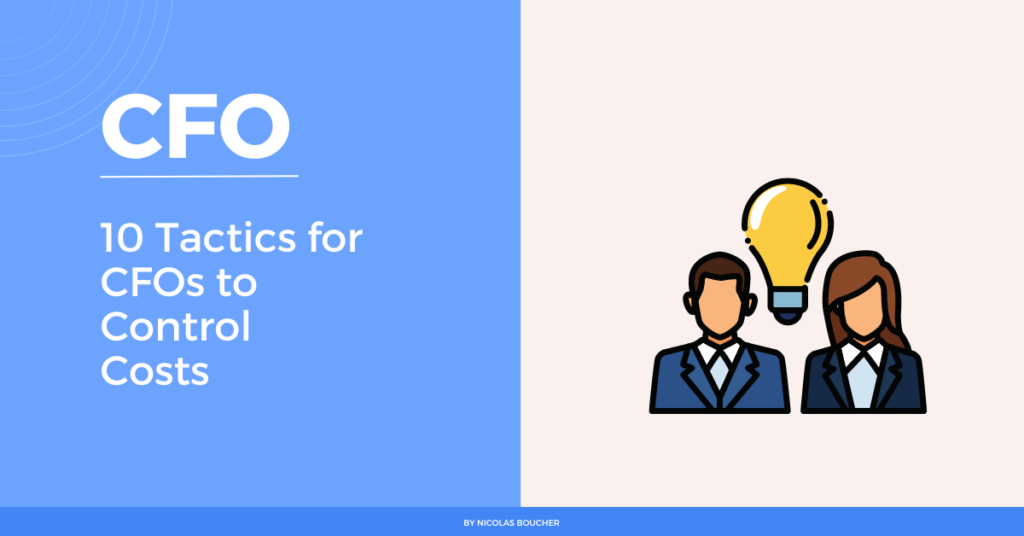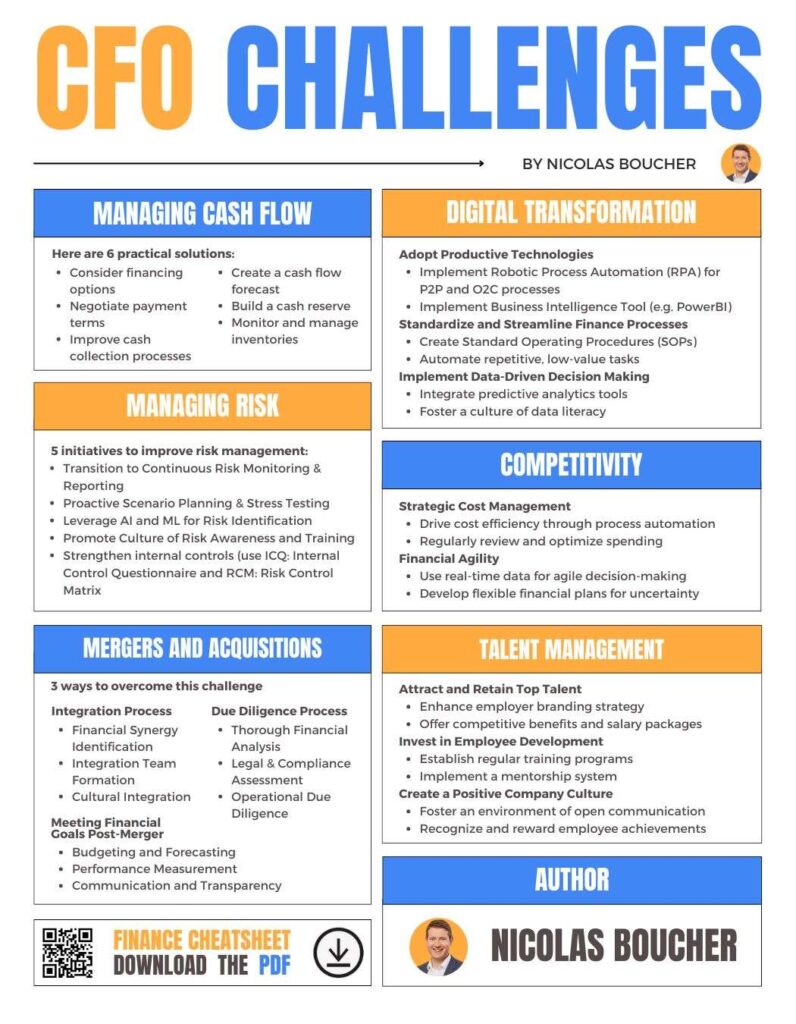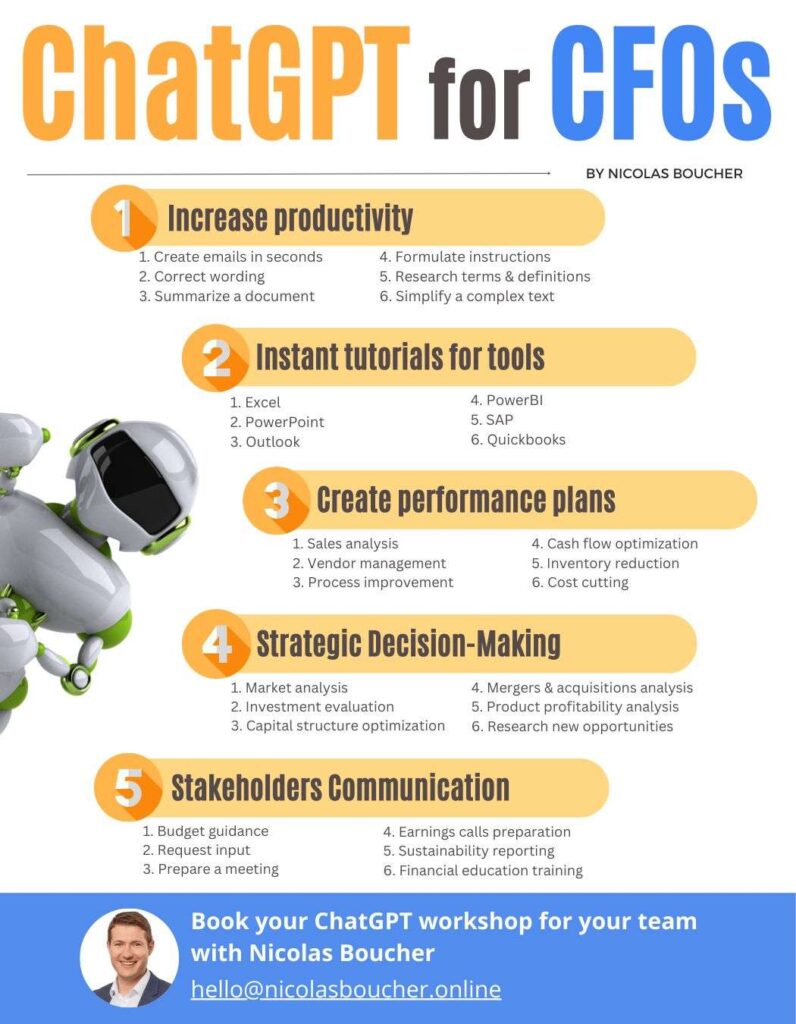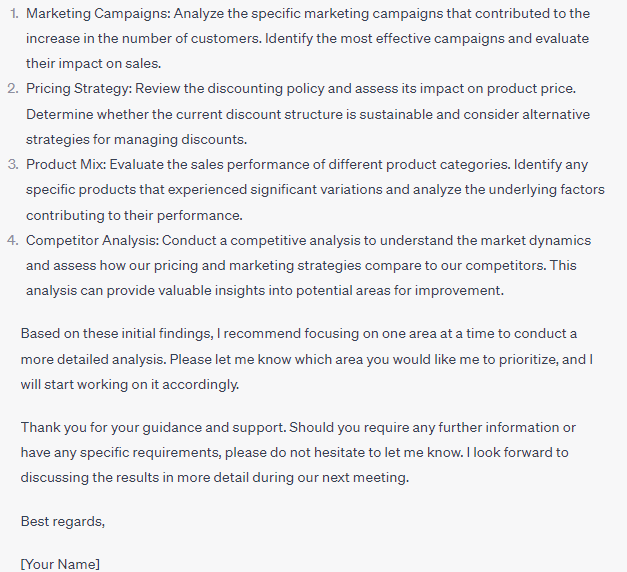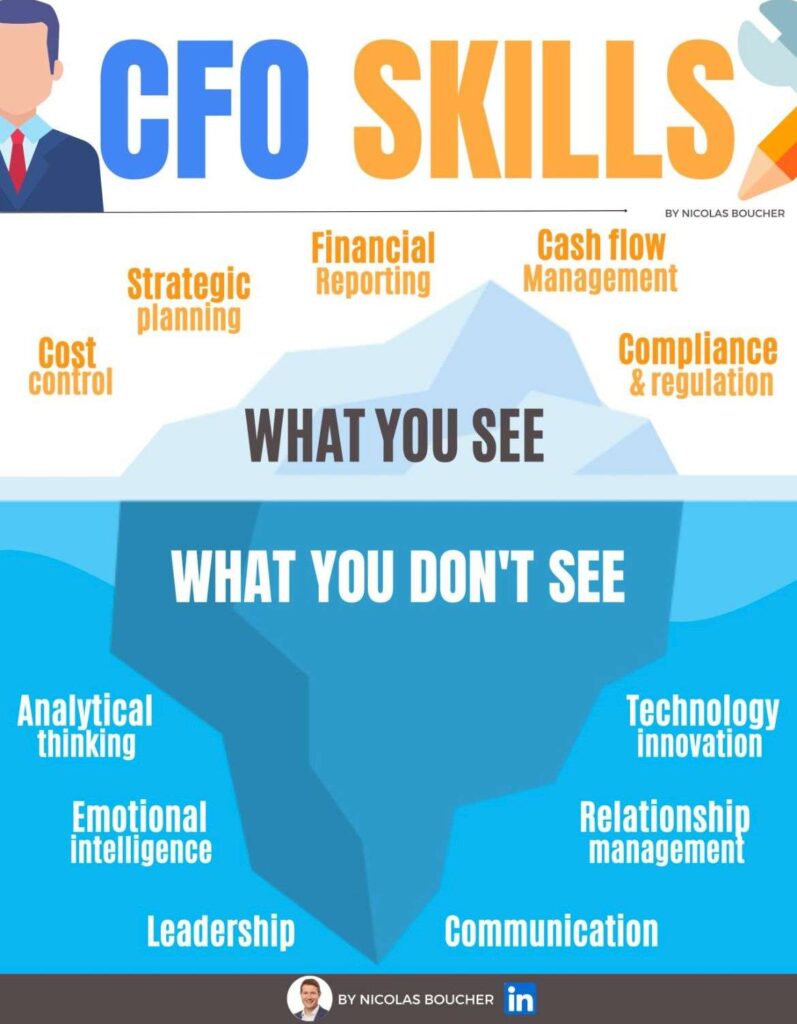Reducing costs has always been a hot topic in every company. But, still, it is important to do it without decreasing the quality or damaging the reputation.
How can you do that?
Here is one situation from my work experience:
When I was head of finance, we faced the challenge of reducing our hourly rate to stay competitive.
This became my number one priority in helping the business. Ultimately, we decreased our hourly rate by 3% while inflation was up!
Today, I will share with you the top 10 processes to reduce costs.
But before that, I have something special for you ONLY THIS WEEK.
Do you feel that not using AI may cause you to lose your job?
AI will not replace humans, but the humans who use AI will replace those who don’t use it.
Don’t let yourself to get into that position, instead take control over your career and streamline your finance work with AI.
Enjoy exclusive content, including news digests on the latest AI developments in finance, weekly AI tools reviews and guides, and regularly updated lists of essential AI tools and GPTs.
But only that!
Here’s what you get by becoming a member of this unique club:
- Live Workshops / 12 live sessions per year ($4,800 Value)
- AI Tools Review for Finance / 12 reviews per year ($2,400 Value)
- AI Courses for Finance / 12 mini-courses per year ($2,400 Value)
- AI News for Finance / 12 digests per year ($2,400 Value)
- AI in Finance Processes / 12 deep dives per year ($2,400 Value)
- Community Chat / instantly available ($2,000 Value)
Get your yearly subscription for $700 instead of the regular price of $1000.
Use discount code AIFC30 at checkout or click here to automatically apply your 30% discount.
In the next 4 days, you have the chance to join the AI Finance Club for $1000 $700 only and save 30%.
This offer ends this Thursday, and it won’t be back—don’t miss out!
Top 10 Processes to Control Costs
Here are my top 10 processes to control your costs:
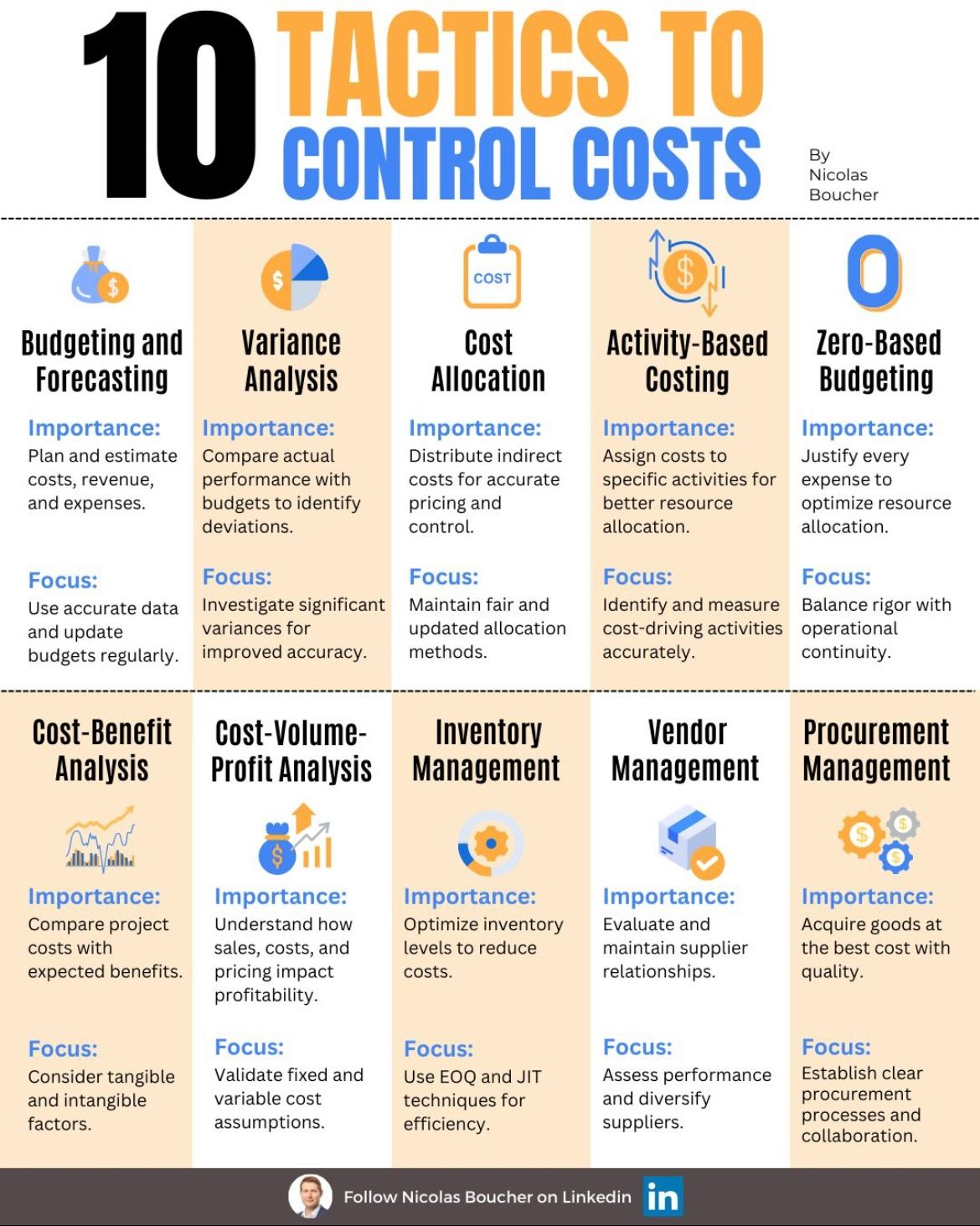
#1: Budgeting and Forecasting
Importance: Plan and estimate costs, revenue, and expenses. This is where you can get your team to commit to cost reduction.
Focus: Use accurate data and update budgets regularly.
How to use this process:
- Gather Historical Data: Collect data from financial statements, accounting records, and other relevant documents from the past 3-5 years.
- Set Financial Goals: Define clear financial goals and objectives for the upcoming budget period, including targets for revenue, expenses, and profit margins.
- Engage Stakeholders: Conduct meetings with department heads to gather input and gain commitment to budget targets.
- Use Budgeting Software: Implement budgeting tools like QuickBooks, SAP, or Microsoft Excel with advanced functions for forecasting and scenario analysis.
- Update Regularly: Schedule monthly or quarterly budget reviews to compare actual performance against the budget, adjusting forecasts as needed based on new information.
#2: Variance Analysis
Importance: Compare actual performance with budgets to identify deviations. If you find a variation, there is a big chance that you have a topic to explore to reduce costs.
Focus: Investigate significant variances for improved accuracy.
How to use this process:
- Establish Benchmarks: Define acceptable variance thresholds (e.g., ±5%) for different budget categories.
- Monthly Review: Perform monthly variance analysis comparing actual figures with budgeted amounts for all expense categories.
- Identify Variances: Use software like Microsoft Power BI or Tableau to highlight significant variances visually.
- Root Cause Analysis: Investigate the root causes of significant variances through interviews, data analysis, and process reviews.
- Action Plans: Develop specific action plans to address variances, such as adjusting procurement practices or renegotiating supplier contracts.
#3: Cost Allocation
Importance: Distribute indirect costs for accurate pricing and control.
Focus: Maintain fair and updated allocation methods.
How to use this process:
- Catalog Indirect Costs: List all indirect costs, such as utilities, rent, and administrative salaries.
- Select Allocation Base: Choose appropriate bases like labor hours, machine hours, or square footage for cost allocation.
- Calculate Allocation Rates: Compute allocation rates using the formula: Allocation Rate = Total Indirect Costs / Total Allocation Base.
- Apply Rates: Allocate indirect costs to cost centers or products using the calculated rates.
- Review Annually: Reassess and update allocation bases and rates annually or whenever significant operational changes occur.
#4: Activity-Based Costing
Importance: Assign costs to specific activities for better resource allocation.
Focus: Identify and measure cost-driving activities accurately.
How to use this process:
- Identify Activities: Break down the production process into discrete activities (e.g., setup, processing, quality control).
- Assign Costs: Determine the cost associated with each activity, including labor, materials, and overhead.
- Allocate Costs: Allocate costs to products based on the extent to which each product uses each activity.
- Analyze Costs: Use the data to identify high-cost activities and focus on reducing or optimizing them.
- Refine Processes: Continuously review and refine activity-based costing to ensure it accurately reflects current operations.
#5: Zero-Based Budgeting
Importance: Justify every expense to optimize resource allocation.
Focus: Balance rigor with operational continuity.
How to use this process:
- Start from Zero: Begin the budgeting process from a zero base, with no pre-approved expenditures.
- Justification: Require each department to justify every expense item as if starting from scratch.
- Prioritize Spending: Rank expenses based on necessity and strategic alignment with company goals.
- Allocate Funds: Allocate funds only to justified expenses, ensuring optimal use of resources.
- Monitor Execution: Continuously monitor spending to ensure adherence to the zero-based budget and make adjustments as necessary.
#6: Cost-Benefit Analysis
Importance: Compare project costs with expected benefits.
Focus: Consider tangible and intangible factors.
How to use this process:
- List Costs: Identify all direct (e.g., materials, labor) and indirect (e.g., administrative support) costs associated with the project.
- Estimate Benefits: Calculate expected benefits, including increased revenue, cost savings, and intangible benefits like improved customer satisfaction.
- Compare Totals: Compare the total costs against the total benefits to assess the project’s viability.
- Sensitivity Analysis: Perform sensitivity analysis to understand the impact of different assumptions on costs and benefits.
- Decision Making: Use the analysis to make informed decisions about whether to proceed with, modify, or reject the project.
#7: Cost-Volume-Profit Analysis
Importance: Understand how sales, costs, and pricing impact profitability.
Focus: Validate fixed and variable cost assumptions.
How to use this process:
- Classify Costs: Categorize costs into fixed and variable components accurately.
- Calculate Contribution Margin: Determine the contribution margin per unit (Selling Price – Variable Cost per Unit).
- Break-Even Point: Calculate the break-even point using the formula: Break-Even Point (Units) = Fixed Costs / Contribution Margin per Unit.
- Scenario Analysis: Conduct scenario analysis to evaluate the impact of changes in sales volume, pricing, and cost structure on profitability.
- Strategic Decisions: Use the insights to make strategic decisions on pricing, product mix, and cost control measures.
#8: Inventory Management
Importance: Optimize inventory levels to reduce costs.
Focus: Use EOQ and JIT techniques for efficiency.
How to use this process:
- EOQ Calculation: Calculate Economic Order Quantity (EOQ) using the formula: EOQ = √(2DS / H), where D = demand, S = ordering cost, H = holding cost.
- JIT Implementation: Implement Just-In-Time (JIT) inventory systems to reduce holding costs by ordering inventory only as needed.
- Regular Audits: Conduct regular inventory audits to ensure accuracy and prevent overstocking or stockouts.
- Supplier Coordination: Work closely with suppliers to ensure timely and accurate deliveries.
- Use Technology: Employ inventory management software to track inventory levels, automate reordering, and forecast demand.
#9: Vendor Management
Importance: Evaluate and maintain supplier relationships.
Focus: Assess performance and diversify suppliers.
How to use this process:
- Vendor Evaluation: Use criteria such as cost, quality, reliability, and delivery performance to evaluate potential vendors.
- Performance Metrics: Establish key performance indicators (KPIs) to monitor vendor performance regularly.
- Regular Reviews: Conduct regular performance reviews and provide feedback to vendors.
- Contract Negotiation: Negotiate favorable terms, including pricing, delivery schedules, and payment terms.
- Diversify Suppliers: Maintain a diverse supplier base to mitigate risks and ensure continuity of supply.
#10: Procurement Management
Importance: Acquire goods at the best cost with quality.
Focus: Establish clear procurement processes and collaboration.
How to use this process:
- Needs Assessment: Conduct a thorough needs assessment to define procurement requirements clearly.
- Sourcing Strategy: Develop a sourcing strategy that includes market analysis, supplier selection criteria, and a competitive bidding process.
- Contract Management: Create and manage contracts to ensure compliance and favorable terms.
- Collaboration: Foster collaboration between procurement and other departments to align procurement activities with overall business objectives.
- Continuous Improvement: Regularly review procurement processes to identify opportunities for improvement and implement best practices.
BONUS
Get my CFO Cheat Sheet for free with the most valuable CFO resources.
Final Words
Cost reduction is not just about cutting expenses; it’s about strategic financial management and optimizing resources for sustainable growth.
The ten processes discussed—budgeting and forecasting, variance analysis, cost allocation, activity-based costing, zero-based budgeting, cost-benefit analysis, cost-volume-profit analysis, inventory management, vendor management, and procurement management—provide a comprehensive framework for achieving this goal.
Each process offers a unique approach to identifying inefficiencies, reallocating resources, and ultimately driving your business toward greater profitability.
Embrace these strategies with a commitment to continuous improvement and foster a culture of financial prudence within your organization. If you want to maximize your cost savings make sure to learn about my top 10 secret tactics here.
By doing so, you position your company not just to survive but to thrive in a competitive market.
REMINDER
Accelerate your career and secure your job by becoming a member of the AI Finance Club. The promotion will end on Thursday, so don’t wait any longer. Become an irreplaceable expert on AI and earn your promotion. Save 30% and join now!
FAQ
Q: How often should we update our budgets to ensure accuracy?
A: It’s best to update your budgets at least quarterly to reflect changes in the business environment. Monthly reviews are advisable for businesses in highly dynamic industries to stay aligned with current financial realities.
Q: What tools can assist with accurate budgeting and forecasting?
A: Popular tools include QuickBooks, SAP, and Microsoft Excel with advanced functions. Additionally, platforms like Adaptive Insights and Anaplan provide robust features for detailed budgeting and forecasting.
Q: What are the main challenges when implementing zero-based budgeting?
A: The main challenges include the time-intensive nature of justifying every expense and potential resistance from departments accustomed to incremental budgeting. Clear communication and training can help mitigate these issues.
Q: How can activity-based costing improve resource allocation?
A: Activity-based costing allows you to assign costs to specific activities, providing a clearer picture of resource use. This enables you to identify high-cost activities and optimize or eliminate them, improving overall efficiency.
Q: What strategies can enhance vendor management?
A: Regularly evaluate vendors based on performance metrics such as cost, quality, and reliability. Maintain strong relationships through open communication and collaboration, and diversify your supplier base to mitigate risks and ensure continuity.

